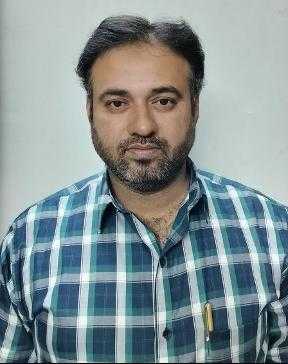
Expert Physiotherapy at Home
Certified physiotherapists visit you at home to provide focused, one-on-one care tailored to your needs. With no travel or waiting rooms, recovery happens in a setting that is comfortable, familiar, and built around your convenience.
Personalised Recovery Programmes
Every treatment plan is designed to suit your condition, goals, and pace. Our physiotherapists follow structured, evolving protocols to ensure consistent progress, with each session aligned to deliver meaningful results.
Trusted Physiotherapists. Real Results.
Our team comprises experienced, background-verified physiotherapists trusted by thousands of families. With a strong focus on safety, reliability, and clinical outcomes, we make recovery at home both effective and reassuring
Patient Testimonials
Portea Physiotherapists for Home Visits
Meet some of our experienced and dedicated healthcare professionals

Dr. Lokesh G
Physiotherapist
Specializations
Experienced in Neurological rehabilitation, Orthopaedic physiotherapy, and Paediatric care
Delivers structured, high-impact treatment plans across neuro, ortho, and paediatrics—ensuring safety, comfort, and measurable recovery at every stage.

Dr. Mohammed Sarwar
Physiotherapist
Specializations
Experienced in Neurological rehabilitation, Adult physiotherapy, and Paediatric care
Combines deep clinical expertise with a compassionate approach, supporting both adults and children through neuro and physical rehabilitation that promotes long-term independence and recovery.

Dr. Nelapati Divya
Physiotherapist
Specializations
Skilled in Orthopaedic rehabilitation, Manual therapy techniques, and Paediatric physiotherapy
Brings a personalised, hands-on approach to healing—combining structural expertise with paediatric sensitivity to restore movement, relieve pain, and improve everyday function.

Dr. Naveen V
Physiotherapist
Specializations
Trained in Pain management, Cardiac and Orthopaedic rehabilitation, Neurological care, and Neural tissue mobilisation
Brings clinical precision and empathy together—designing science-backed recovery protocols for pain relief, nerve mobilisation, and cardio-neuro-ortho rehabilitation across all age groups

Dr. Miloni Savla
Physiotherapist
Specializations
Holds an MPT in Orthopaedics with a focus on Musculoskeletal rehabilitation and strength recovery
Delivers focused, movement-oriented therapy grounded in orthopaedic science—helping patients rebuild strength, restore function, and return to daily life with confidence
Other Cities
Physiotherapy Treatments

introduction
Vertigo is an abnormal sensation of motion, or an illusion that you or your surroundings are moving when there is no actual motion. Vertigo can feel like spinning, whirling, or moving vertically or horizontally.
BPPV is a biomechanical disorder, the most common cause of peripheral vertigo.
classification
- Vestibular or peripheral origin
- Non-Vestibular or central origin
signs and symptoms
Vertigo and nystagmus with change in head position, occasionally nausea with or without vomiting.
causes
BPPV occurs due to dislodging of calcium carbonate crystals (otoconia) within the fluid filled semicircular canals of inner ear (canalithiasis & cupulolithiasis).
BPPV can occur due to primary causes (idiopathic) and secondary causes (head trauma, labyrinthitis, Meniere disease, vestibular neuronitis, inner ear surgery).
risks
BPPV affects certain populations more frequently.
- Demographics: BPPV primarily affects individuals of advanced age, typically over 60 years.
Females are more likely to experience BPPV than males.
- Risk Factors: Secondary causes of BPPV increase the likelihood of developing the condition.
prevention
BPPV can’t be prevented. However, maintaining adequate Vitamin-D and Calcium levels is proved to be helpful.
diagnosis
A detailed history and physical examination like asking the patient about duration of the episode, under what circumstances the symptoms occur, with particular movement, positions or at rest is done.
- The Dix-Hallpike maneuver is the only standard clinical test of great significance in BPPV.
- Eye examination for nystagmus.
Points to remember for history and physical examination of patients with BPPV:
- A central disorder is responsible if vertigo has no relation to movements. Labyrinthitis or vestibular neuronitis may mimic BPPV; however, unlike BPPV, movement in any plane can trigger a spell that usually persists for days.
- BPPV often lasts more than 30 seconds. In contrast, vertigo due to other disorders is of longer duration, such as an episode of Meniere disease last for hours, vestibular neuronitis or viral labyrinthitis persists for days, migraines have a variable duration and the rest of the central disorders may be constant.
- BPPV is episodic in nature.
- Dix-Hallpike maneuver must be positive.
- Vertigo due to BPPV is usually intense. Central causes should be considered if vertigo is mild.
- BPPV is sudden in origin, while central causes are present gradually.
BPPV may have the following differential diagnoses:
BPPV shares symptoms with various conditions, making differential diagnosis crucial. These include:
- Meniere disease, characterized by inner ear disorders
- Alcohol intoxication, causing balance disturbances
- Labyrinthitis or vestibular neuronitis, involving inner ear inflammation
- Positional nystagmus of central origin, related to brain stem or cerebellar issues
- Stroke, cerebellar degeneration, or ischemia, affecting brain function
- Acoustic neuroma and meningioma, involving tumors
- Vertebral artery insufficiency, impacting blood flow
- Orthostatic hypotension, causing dizziness upon standing
treatment
Effective management of BPPV involves a combination of patient education, manual maneuvers, and exercises.
Initial Treatment
- Patient education and proper counseling to understand the condition
- Canalith repositioning maneuver (CRM) to relocate calcium particles
- Liberatory Semont maneuver, an alternative to CRM
exercises
Regular exercises enhance recovery and reduce symptom recurrence:
- Brandt-Daroff exercises to improve vestibular function
- Gaze stability exercises for enhanced visual focus
- Postural stability and habituation exercises to improve balance
- Balance exercises to promote overall equilibrium
By incorporating these treatments and exercises, individuals can alleviate BPPV symptoms, improve balance, and enhance overall quality of life.
physiotherapy
Physiotherapy can help frequent or severe vertigo. Exercises are designed to provoke mild symptoms so that we get used to the stimuli and thus improve the quality of life.
how portea helps
Portea provides hassle free personalized professional care with the comfort of getting treated at home, and a multidisciplinary healthcare team ready to minimise the patients limitations.
At Portea, we offer Physiotherapy at Home services to address a variety of health conditions. Our physiotherapy programs are tailored to support recovery from sports injuries and post-surgical rehabilitation, while also providing effective management for back pain, arthritis, shoulder pain, and slipped disc issues. For those with respiratory disorders like COPD, we focus on targeted breathing exercises that enhance lung function. Additionally, our physiotherapists are experienced in neuro-rehabilitation for individuals recovering from stroke or managing paralysis, with specialized exercises designed to improve strength, balance, and mobility. With Portea, you can access professional, personalized physiotherapy in the comfort of your home, designed to enhance your quality of life.
Portea provides a range of services to support your health, including nursing care at home, nursing attendants at home, and options to rent or purchase medical equipment at home. We also offer home vaccinations, personalized diabetes care plans, mothers and baby care plans at home. Our goal is to deliver compassionate, tailored care right where you need it.
conclusion
BPPV is a non life threatening condition. Individualized approach to Vestibular rehabilitation is important to enhance quality of life.
faq’s
1. How long does BPPV episode last?
A BPPV episode typically lasts a few seconds to a minute but may reoccur until treated.
2. Does BPPV resolve on its own?
Yes, BPPV can resolve on its own, but treatment often speeds up recovery.
3. How can I avoid episodes due to BPPV?
Avoiding sudden head movements, sleeping slightly elevated, and moving carefully can help reduce BPPV episodes.
4. Will BPPV go away on its own?
BPPV can go away without treatment, though it may take weeks or months to fully resolve.
5. What triggers a BPPV episode?
Quick head movements, rolling over in bed, or looking up or down can trigger a BPPV episode.
6. Can physio help with positional vertigo?
Yes, physiotherapy can help by using repositioning maneuvers to alleviate symptoms of positional vertigo.
7. What is the best therapy for vertigo?
The Epley maneuver is often the most effective therapy for vertigo caused by BPPV.
8. How do I permanently stop BPPV?
Regularly performing positional maneuvers and avoiding known triggers can help reduce recurrence.
9. What is the fastest way to cure vertigo?
The fastest way to relieve BPPV is usually through repositioning maneuvers like the Epley maneuver performed by a trained therapist.
Doctor Consultation
Nursing
Physiotherapy
Trained Attendant
Elder Care
Mother & Baby Care
Lab Tests
Medical Equipment
Speciality Pharma
Critical Care




